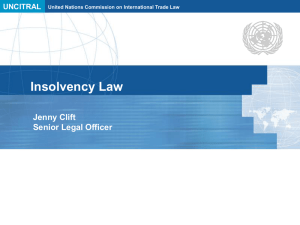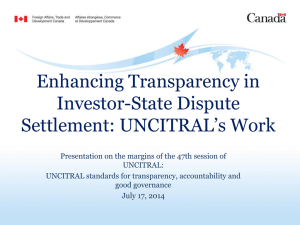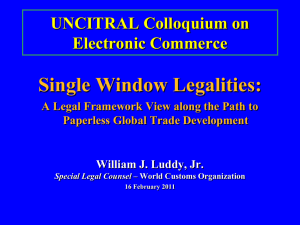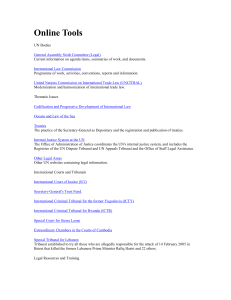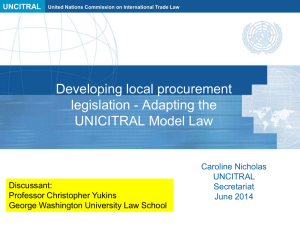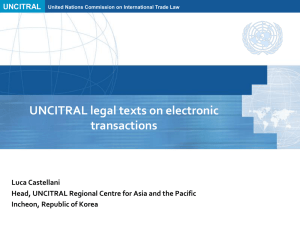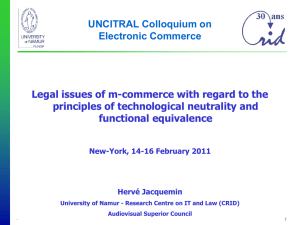The Influence of the UNCITRAL Guide on Secured Transactions Law
advertisement
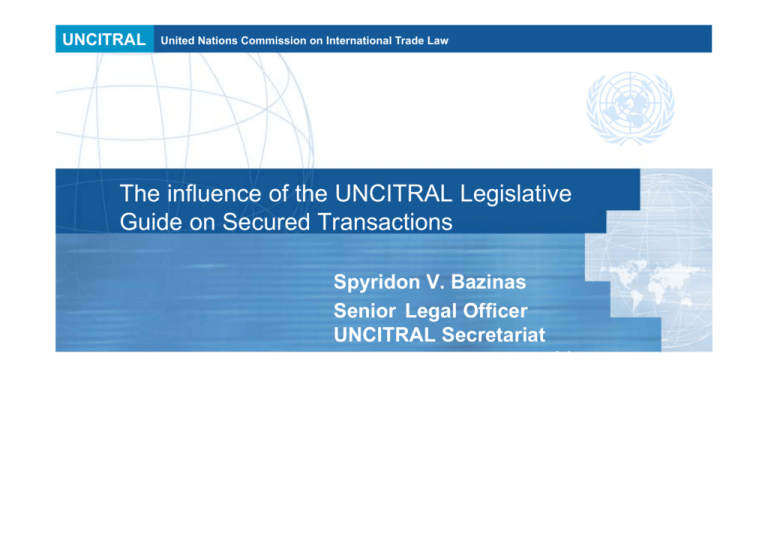
UNCITRAL United Nations Commission on International Trade Law The influence of the UNCITRAL Legislative Guide on Secured Transactions Spyridon V. Bazinas Senior Legal Officer UNCITRAL Secretariat LL Outline 1. 2. 3. The influence of the ST Guide Reasons for the influence of the ST Guide 2.1. General 2.2. A guide 2.3. An UNCITRAL guide 2.4. Flexibility and certainty combined 2.5. The functional approach: modernization and harmonization 2.6. Transparency: 3-P effectiveness and registration 2.7. Certainty and predictability combined: priority and enforcement 2.8. Acquisition financing 2.9. Harmonization of applicable law rules 2.10. Coordination with insolvency law 2.11 Coordination with ST texts of other organizations Conclusions UNCITRAL United Nations Commission on International Trade Law 1. The influence of the ST Guide • International standard for an efficient ST Law • Reference tool for the modernization and harmonization of ST law • Examples – DCFR – IFC ST toolkit – Draft WB/UNCITRAL Principles on Insolvency and Creditor/Debtor Rights – Australia, Colombia, Ghana, Japan, Kenya, Malawi, Mexico, S. Korea UNCITRAL United Nations Commission on International Trade Law 2.1. • Reasons for the influence of the ST Guide: general The ST Guide builds on national and international ST law – US Article 9 UCC, Canadian and NZ PPSA – EBRD, OAS, Unidroit, Hague Conference • Key objective to facilitate secured financing – Holistic approach addressing all key ST law issues, but also registration, acquisition financing, insolvency and applicable law • Neutral terminology (security right, 3-effectiveness, acquisition financing) • Harmonization with existing law and legislative method and drafting technique UNCITRAL United Nations Commission on International Trade Law 2.2. • Reasons for the influence of the ST Guide: a guide A guide – Soft law approach (not a Convention or ML) – Non-binding instrument: respect for State sovereignty – Prepared by an int’l legislative body, in which the legislative initiative is taken by nat’l Governments and the law has to be approved by nat’l legislatures and applied by nat’l courts: respect for the principle of separation of powers • A legislative guide – Addressed to the legislator, not contractual guide addressed to parties • The persuasive value of the commentary – A State may follow the commentary or the recommendation UNCITRAL United Nations Commission on International Trade Law 2.3. Reasons for the influence of the ST Guide: an UNCITRAL guide • UNCITRAL: global body, subsidiary organ of the U.N. G.A. • Catholic participation, Orthodox consensus and protestant reality! • Known track record: CISG, ML and Rules on Arbitration, Insolvency and ST guides, E-commerce MLs and Convention, Transport Law Conventions, Procurement ML and Guide • Quality of work: the Commission, its six working groups, the Secretariat and the international expert community UNCITRAL United Nations Commission on International Trade Law 2.4. Reasons for the influence of the ST Guide: flexibility and certainty combined • Flexibility – General and asset-specific commentary explaining the policy issues and the possible workable approaches with pros and cons – Examples: acquisition financing, insolvency, PIL • Certainty – General and asset-specific legislative recommendations – Examples: creation, 3-P effectiveness, priority and enforcement UNCITRAL United Nations Commission on International Trade Law 2.5. Reasons for the influence of the ST Guide: the functional approach, modernization and harmonization • The principle of “substance over form”: all devices serving security purposes are covered, including ROT sales and financial leases • Modernization and rationalization of ST law – Certainty and transparency – Competition among credit providers which is likely to have a beneficial impact on the availability and the cost of credit • Harmonization of ST law: cross-border recognition of security devices (e.g. ROT sales) UNCITRAL United Nations Commission on International Trade Law 2.6. Reasons for the influence of the ST Guide: transparency, 3-P effectiveness and registration • Registration of a notice in the security rights registry+creation= third-party effectiveness – Simplifies creation – Facilitates functional approach (e.g. inclusion of ROT sales) – Possible to avoid splitting the effectiveness of an SI and use registration as a basis for determining priority • Registration – – – – – Notice, not document registration Minimum content of notice: publicity and confidentiality combined Legal consequence: third-party effectiveness and basis for priority Electronic registry: time- and cost-efficiency Registration regulations: the Registry Guide UNCITRAL United Nations Commission on International Trade Law 2.7. Reasons for the influence of the ST Guide: certainty and predictability combined-priority and enforcement • Comprehensive set of priority rules: – First in time of registration or third-party effectiveness – Exceptions: registration in an IP registry, possession of ND or control of B/A beats registration – Subordination: no effects on third parties • Enforcement: – – – – Good faith and reasonable commercial standards Judicial enforcement: expedited procedures Extra-judicial enforcement: protection of debtor and third parties Judicial enforcement is not a panacea and extra-judicial enforcement is not a ghost! – Either one can work depending on enforcement infrastructure and market conditions UNCITRAL United Nations Commission on International Trade Law 2.8. Reasons for the influence of the ST Guide: acquisition financing • ROT sales, financial leases, acquisition SIs – Equal treatment of all credit providers. • Unitary and non-unitary approach: – Both follow the functional approach, but there is difference in terminology and level of complexity. • Importance and priority of acquisition financing – Acquisition secured creditor has priority if registration takes place within a short period of time after delivery of the assets – Priority of an acquisition security right extends to proceeds except cash proceeds of inventory UNCITRAL United Nations Commission on International Trade Law 2.9. Reasons for the influence of the ST Guide: harmonization of applicable law rules • Matters covered: creation, 3-party effectiveness and priority of an SI (in most cases subjected to the same law) • Lex rei sitae for security rights in tangibles – – – • Law of the grantor’s location for intangibles – • Exceptions: BAs, LCs and IP Separate rule for mutual rights and obligations of the parties – • Law of the grantor’s location for mobile goods Exception: goods subject to specialised registration Special rule for goods in transit and export goods Law chosen by the parties. Separate rule for enforcement – – Tangibles: lex fori Intangibles: law governing priority UNCITRAL United Nations Commission on International Trade Law 2.10. Reasons for the influence of the ST Guide: harmonization of applicable law rules: coordination with insolvency law • Encumbered assets part of the estate and subject to stays – Liquidation v. reorganization – Relief for secured creditor – Protection of the value of the assets • Effectiveness of an SI respected, subject to avoidance actions • Priority of an SI preserved, subject to preferential claims • In re-organization, secured creditors to receive as much as in liquidation • Post-commencement financing (no priority unless ordered by the insolvency court subject to protection of SIs) UNCITRAL United Nations Commission on International Trade Law 2.11. Reasons for the influence of the ST Guide: coordination with ST texts of other organizations • Securities and financial contracts are excluded – No overlap with Hague or Geneva Securities Conv. • Mobile equipment: not covered if matters are covered in other nat’l law or int’l treaty • Intellectual property: not covered if treatment is inconsistent with IP law • The joint publication of UNCITRAL, the Hague Conference and Unidroit UNCITRAL United Nations Commission on International Trade Law 3. Conclusions • The ST Guide is becoming a generally accepted international standard and is being used as a reference tool for the modernization and harmonization of ST law • The reasons lie in the fact that it is a text prepared by an authoritative int’l legislative organ like UNCITRAL and combines flexibility with certainty, transparency and predictability, and coordinates with registration, insolvency, IP and private international law • Equally important is the fact that the ST Guide, together with texts of other organizations presents States with a comprehensive, efficient and internally consistent ST regime UNCITRAL United Nations Commission on International Trade Law The beginning of the project UNCITRAL United Nations Commission on International Trade Law The objective of ST law UNCITRAL United Nations Commission on International Trade Law UNCITRAL United Nations Commission on International Trade Law UNCITRAL United Nations Commission on International Trade Law UNCITRAL United Nations Commission on International Trade Law THANK YOU! • For information on the work of UNCITRAL, see http://www.uncitral.org • The views expressed in this presentation are the personal views of the speaker and do not necessarily reflect the views of the United Nations or UNCITRAL. • © Spyridon V. Bazinas. UNCITRAL United Nations Commission on International Trade Law

